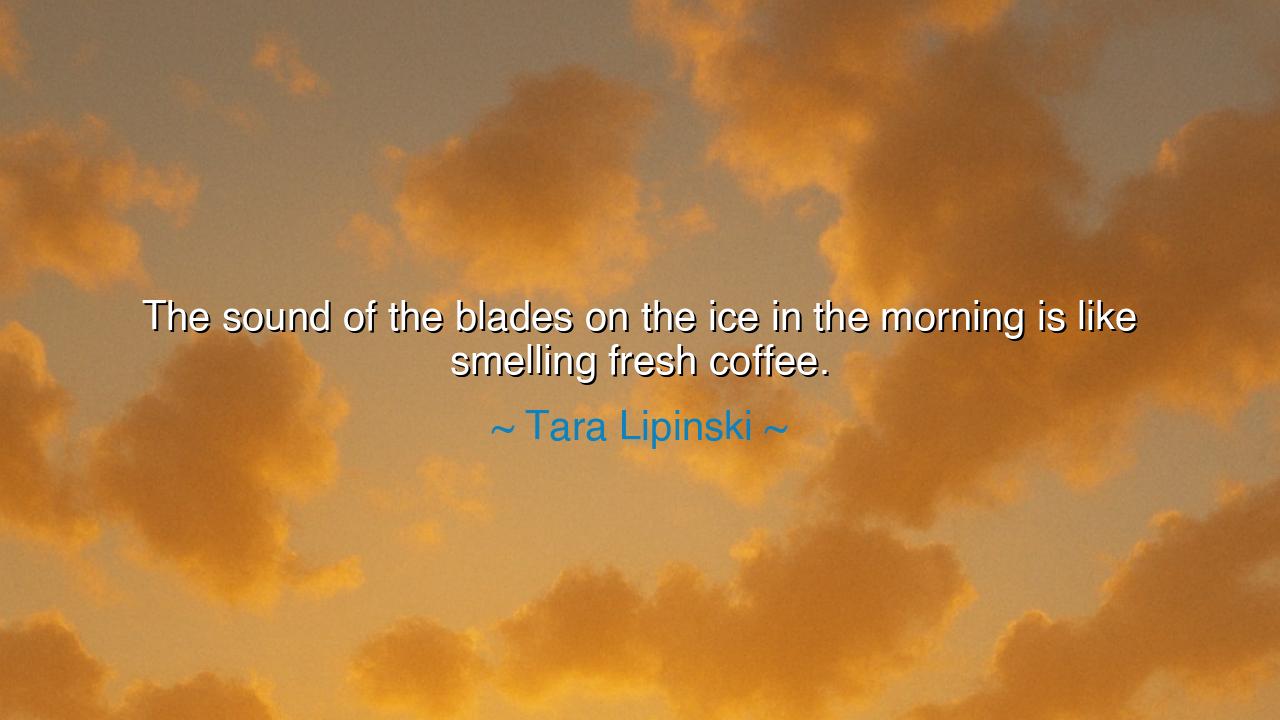
The sound of the blades on the ice in the morning is like






Tara Lipinski once spoke with poetic simplicity: “The sound of the blades on the ice in the morning is like smelling fresh coffee.” In these words, we hear not only the description of a skater’s joy but a profound truth about devotion, passion, and the sacred rituals of daily life. To the figure skater, the scraping of the blades is not mere noise; it is music, a herald of purpose. It awakens the soul just as coffee stirs the weary body, filling one with energy, clarity, and anticipation for the day’s journey.
The origin of this truth lies in the deep relationship between discipline and delight. Every athlete, every artist, every seeker of mastery knows the early hours, when the world is quiet and the heart beats only for its craft. Lipinski, who rose to Olympic glory through relentless training, reveals here that the small sounds of her labor are themselves a source of joy. For the ancients would say: when duty becomes delight, mastery is near. To love the sound of one’s own practice is to walk the path not only of skill but of harmony with one’s calling.
Consider the story of the sculptor Michelangelo, who would rise before dawn and set his chisel to stone. To others, the sharp crack of marble splitting may have sounded harsh, but to him, it was the music of creation, the voice of beauty hidden within rock. So too with Lipinski: what others may hear as cold steel upon ice, she hears as promise and inspiration. Both reveal that greatness is found when even the smallest details of one’s work become beloved.
There is an emotional power in comparing the sound of blades to the smell of coffee. Both are simple, everyday sensations, yet both carry immense meaning to those who cherish them. Coffee, for many, is the ritual of awakening, the taste of renewal, the call to begin again. The morning scrape of blades is the same for the skater—it is the herald of effort, of grace, of the sacred communion between body and art. By linking the two, Lipinski bridges the extraordinary with the ordinary, teaching us that passion sanctifies even the smallest rituals of life.
Her words also carry a heroic undertone. For to skate in the early morning, before the world has stirred, is an act of devotion. The ice is fresh, the arena quiet, and in that stillness the skater lays down invisible foundations of victory. It is a reminder that greatness is not forged in the blaze of the spotlight, but in the silent hours when no one watches. The sound of the blades at dawn is not applause—it is preparation, sacrifice, and faith that persistence will bear fruit.
The lesson for us is timeless: find joy in the rituals of preparation. Do not wait for the grand moment to awaken your spirit. Instead, let the small sounds, smells, and sights of your daily discipline fill you with gratitude and purpose. Whether it be the shuffle of papers for a writer, the hum of strings for a musician, or the hiss of steel upon ice for a skater—let these be your morning coffee, the sign that you are alive, striving, and walking your path.
Practical action follows this wisdom: when you wake, create a ritual that awakens your heart for the day. Stretch, breathe, read, or practice your craft. Do it with reverence, for even the smallest act, if embraced with love, can transform your spirit. Just as Lipinski cherished the sound of the blades, so too can you cherish the unique music of your own journey.
Thus, her words endure not only as a skater’s memory but as a teaching for all: “The sound of the blades on the ice in the morning is like smelling fresh coffee.” To live with such joy is to discover that life’s meaning is not only in the grand victories but in the small, daily awakenings that prepare us for them. Let us then rise each day with gratitude, hear the music in our labors, and savor the rituals that remind us we are alive and ready to strive.






AAdministratorAdministrator
Welcome, honored guests. Please leave a comment, we will respond soon